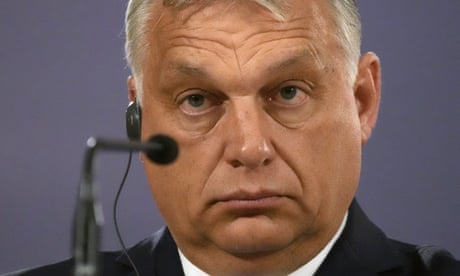Ruling is part of ongoing fight for rule of law and freedom from discrimination in heart Europe

LGBTQ+ activists walk past a rainbow-coloured heart in front of Hungary’s parliament building in Budapest. Photograph: László Balogh/AP
Jennifer Rankin in Brussels
Thu 15 Jul 202
The EU executive has launched legal action against Hungary and Poland to defend LGBTQ+ rights in the latest battle over values with the two nationalist governments in central Europe.
The announcement that Hungary and Poland’s governments could end up in the EU’s highest court is part of an ongoing existential fight for the rule of law and freedom from discrimination in the heart of Europe.
The case against Hungary was triggered by a recently adopted law banishing LGBTQ+ people from books and TV for under-18s, a measure denounced as “shameful” by the European Commission’s president, Ursula von der Leyen. In Poland, the commission considers local authorities have failed to help with its inquiries into resolutions in favour of “LGBT ideology free zones”, passed in more than 100 Polish towns and villages
The commission was under pressure to act after the European parliament denounced the Hungarian law outlawing LGBTQ+ people from being shown in educational content or entertainment that might be seen by under-18s.
The commission said this broke several EU laws, including its audiovisual media services directive, which sets EU rules for TV and streaming services, as well as the freedom to provide services and the free movement of goods, two cornerstones of union law.
The case also takes aim at Hungary’s consumer protection authority, which required a publisher to put a disclaimer on an anthology of fairytales, Wonderland Is For Everyone, because the book was deemed to show “behaviour deviating from traditional gender roles”.
“This law uses the protection of children, to which we are all committed, as an excuse to severely discriminate against people because of their sexual orientation. This law is disgraceful,” von der Leyen told MEPs last week.
Jennifer Rankin in Brussels
Thu 15 Jul 202
The EU executive has launched legal action against Hungary and Poland to defend LGBTQ+ rights in the latest battle over values with the two nationalist governments in central Europe.
The announcement that Hungary and Poland’s governments could end up in the EU’s highest court is part of an ongoing existential fight for the rule of law and freedom from discrimination in the heart of Europe.
The case against Hungary was triggered by a recently adopted law banishing LGBTQ+ people from books and TV for under-18s, a measure denounced as “shameful” by the European Commission’s president, Ursula von der Leyen. In Poland, the commission considers local authorities have failed to help with its inquiries into resolutions in favour of “LGBT ideology free zones”, passed in more than 100 Polish towns and villages
The commission was under pressure to act after the European parliament denounced the Hungarian law outlawing LGBTQ+ people from being shown in educational content or entertainment that might be seen by under-18s.
The commission said this broke several EU laws, including its audiovisual media services directive, which sets EU rules for TV and streaming services, as well as the freedom to provide services and the free movement of goods, two cornerstones of union law.
The case also takes aim at Hungary’s consumer protection authority, which required a publisher to put a disclaimer on an anthology of fairytales, Wonderland Is For Everyone, because the book was deemed to show “behaviour deviating from traditional gender roles”.
“This law uses the protection of children, to which we are all committed, as an excuse to severely discriminate against people because of their sexual orientation. This law is disgraceful,” von der Leyen told MEPs last week.

Protesters in front of the Georgian embassy in Warsaw, Poland. Photograph: Piotr Molęcki/East News/Rex/Shutterstock
Polish authorities, the commission said, had failed to cooperate with its inquiries into so-called LGBT-ideology free zones, which officials suspect break EU law on non-discrimination.
The two countries have two months to respond to the commission, the first stage in the EU sanctions procedure that can end in the European court of justice (ECJ) and a punishment of daily fines.
The announcements on Thursday came soon after the ECJ ruled that Poland’s system of disciplining judges was incompatible with EU law.
That ruling intensifies the conflict between EU authorities and the Polish government, one day after Poland’s top court rejected an ECJ demand to suspend a newly created body to discipline supreme court judges, a decision described as legal “Polexit” by the EU.
Soon after taking office in 2015, Poland’s ruling Law and Justice party embarked on a rapid overhaul of its legal system that has been widely criticised by independent observers for weakening judicial independence and increasing government control. Those changes include setting up a disciplinary chamber for Poland’s supreme court consisting of new judges.
The ECJ said on Thursday the disciplinary chamber “does not provide all the guarantees of impartiality and independence” and was not protected from “direct or indirect influence” of the government or lawmakers.
Under the disciplinary system, Polish judges can be sanctioned for their judgments in the lower courts, an arrangement that “could be used in order to exert political control” over decisions or “exert pressure on judges with a view to influencing their decisions”, an ECJ statement said.
Polish judges can also be disciplined if they refer cases to the Luxembourg court for a preliminary ruling, a move that strikes at the heart of the EU’s legal order.

EU parliament condemns Hungary’s anti-LGBT law
The ECJ has called for “measures necessary to rectify the situation”. The Luxembourg-based court had already issued a temporary injunction suspending the disciplinary tribunal pending Thursday’s judgment, the decision that prompted Poland’s supreme court to declare it did not have to follow EU law.
The judgment is a win for the commission, which has taken the Polish government to court multiple times over violations of the rule of law. But it may be a bittersweet victory as Polish judges contest the supremacy of EU law, a cornerstone of how the union functions.
The Polish prime minister, Mateusz Morawiecki, said on Thursday it was “an obvious conclusion for any Polish citizen that the constitution is the highest legal act”. Both he and the country’s justice minister, Zbigniew Ziobro, said they considered the EU stance to be politically motivated.
A commission spokesperson said: “The commission is deeply concerned by the decision of the Polish constitutional tribunal yesterday … This decision actually reaffirms our concerns about the state of the rule of law in Poland.”
Polish authorities, the commission said, had failed to cooperate with its inquiries into so-called LGBT-ideology free zones, which officials suspect break EU law on non-discrimination.
The two countries have two months to respond to the commission, the first stage in the EU sanctions procedure that can end in the European court of justice (ECJ) and a punishment of daily fines.
The announcements on Thursday came soon after the ECJ ruled that Poland’s system of disciplining judges was incompatible with EU law.
That ruling intensifies the conflict between EU authorities and the Polish government, one day after Poland’s top court rejected an ECJ demand to suspend a newly created body to discipline supreme court judges, a decision described as legal “Polexit” by the EU.
Soon after taking office in 2015, Poland’s ruling Law and Justice party embarked on a rapid overhaul of its legal system that has been widely criticised by independent observers for weakening judicial independence and increasing government control. Those changes include setting up a disciplinary chamber for Poland’s supreme court consisting of new judges.
The ECJ said on Thursday the disciplinary chamber “does not provide all the guarantees of impartiality and independence” and was not protected from “direct or indirect influence” of the government or lawmakers.
Under the disciplinary system, Polish judges can be sanctioned for their judgments in the lower courts, an arrangement that “could be used in order to exert political control” over decisions or “exert pressure on judges with a view to influencing their decisions”, an ECJ statement said.
Polish judges can also be disciplined if they refer cases to the Luxembourg court for a preliminary ruling, a move that strikes at the heart of the EU’s legal order.

EU parliament condemns Hungary’s anti-LGBT law
The ECJ has called for “measures necessary to rectify the situation”. The Luxembourg-based court had already issued a temporary injunction suspending the disciplinary tribunal pending Thursday’s judgment, the decision that prompted Poland’s supreme court to declare it did not have to follow EU law.
The judgment is a win for the commission, which has taken the Polish government to court multiple times over violations of the rule of law. But it may be a bittersweet victory as Polish judges contest the supremacy of EU law, a cornerstone of how the union functions.
The Polish prime minister, Mateusz Morawiecki, said on Thursday it was “an obvious conclusion for any Polish citizen that the constitution is the highest legal act”. Both he and the country’s justice minister, Zbigniew Ziobro, said they considered the EU stance to be politically motivated.
A commission spokesperson said: “The commission is deeply concerned by the decision of the Polish constitutional tribunal yesterday … This decision actually reaffirms our concerns about the state of the rule of law in Poland.”
No comments:
Post a Comment